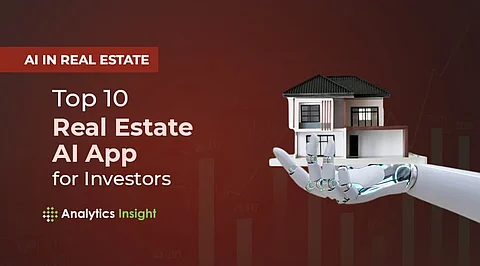
- Insights
- Cryptocurrencies
- Stocks
- White Papers
- Industry
- Geography
- Insights
- Cryptocurrencies
- Stocks
- White Papers
- Industry
- Geography


Global pandemic limitations have had a direct influence on traditional real estate processes – and for the better, unexpectedly. Thousands of businesses, realtors, appraisers, mortgage lenders, and others have been forced to manage the crisis by incorporating rapidly emerging PropTech, and with good cause. Real estate AI apps can manage predetermined data flows, learn user behavior, streamline and speed operations, and allow more accurate assessments and market forecasts in the short term. Real estate AI apps are being embraced by homeowners, potential renters, and purchasers, and investors are aware that real estate is the world's greatest asset class. These top 10 AI apps help real estate professionals interact with prospects more rapidly, boost sales, manage renters and properties, and more. The top 10 real estate AI apps are listed below.
IBM's TRIRIGA application AI solution efficiently manages and reduces real estate office space waste. According to the JLL study, 30-40% of corporate space is now underutilized, resulting in cost savings of thousands of dollars. This intelligent AI assistant learns how employees use space, gathers information from multiple sources such as Wi-Fi and linked sensors, and presents it in digestible chunks. The system's voice-only engagement option is the cherry on top.
Houzen is a simple, quick, and effective solution for homeowners in need of a realtor quickly. It screens agents by local competence, accreditations, and success rates within 24 hours. The entire workflow is sped up using this one of the best real estate AI apps. By analyzing the user's desire to pay, the software closes deals faster than traditional techniques.
Hyro is the world's first adaptive real estate communications platform. When busy realtors can't, Hyro's round-the-clock AI agents step in, capturing every lead from call centers, SMS, and web-based inquiries. Property management businesses can enhance their digital platforms to increase conversion rates if they have access to new conversational insights. Rather than hiring more customer service representatives, realtors can use artificial intelligence virtual assistants with NLU-powered insights and voice, text, and touch capabilities to manage relationships with potential buyers, renters, and current tenants, resulting in improved interactions, engagement, conversions, and retention.
The Rex real estate business aims to remove the worry and complexity out of selling and purchasing a home. By recording user activity on their website, Rex utilizes artificial intelligence to replace agents. It shows advertising that is relevant to the user's interests and uses clever algorithms to examine homeowner history data to determine purchasing capacities.
Zillow has been on the forefront of innovation in the global PropTech and have been on the forefront of taking risks to push the home sales industry forward where others wouldn't," comments Ruban Selvanayagam, a UK online real estate auctioneer.
Among the top real estate AI apps, this is used by over 14,000 agents in over 100 locations throughout the United States to discover and sell homes. The software, like Zillow, provides users with tailored recommendations based on their past searches and interests. CRM-integrated AI is also used to keep agents up to speed on client behavior.
Unlike Rex, Redfin employs real estate AI to assist rather than replace agents. It streamlines client searches and only charges a 1% fee on each sale. An AI matchmaking tool examines data to make recommendations to potential buyers. It also publishes real-time housing market information.
The application of AI in real estate is ideal for cost estimations and predictive analytics. This one of the best real estate AI apps used by HouseCanary assesses current and near-future house prices. It accomplishes this by analyzing data from the previous 40 years and generating forecasts with a margin of error of only 2.5%, resulting in more informed purchasing decisions and higher customer conversions.
Customers can search for their ideal home by looking at original neighborhood photos, drone footage, resident reviews, and local insights on Trulia. Again, intelligent AI algorithms enable the app to remember browsing criteria and preferred items to recommend options – everything from construction materials to wall colors based on favorite photos. As a result, the user experience is highly personalized.
By partnering with leading commercial real estate firms, Skyline AI establishes next-generation, artificial intelligence augmented commercial investment management solutions. The company also has an investment calculator, and its deep-dive analysis of previous deals helps predict market trends like rental costs and return on investment for buyers.
In-depth market analysis, rapid deal closure, cost savings on energy, fees, and meetings, high conversion rates, data-driven choices, and automated processes are just a few of the key benefits that artificial intelligence provides to the market. As you can see from the examples above, AI and real estate are a perfect combination. Because of the huge amounts of data available in the sector, both firms and customers may reduce costs and risks by using smart software solutions. The real estate sector is learning how to manage the vast volumes of data that buildings create, as well as monitor specific KPIs to simplify operations and extrapolate important information, thanks to breakthroughs in machine learning and the rapid growth of AI algorithms. Gradually, using these real estate AI apps, AI in real estate is gaining more popularity.
